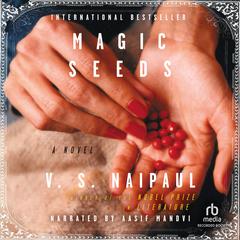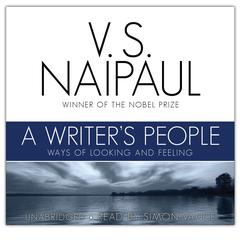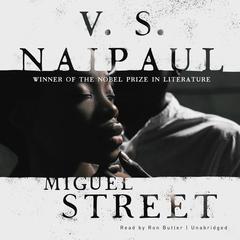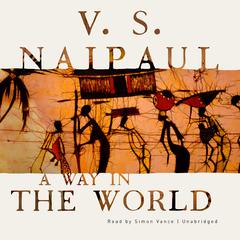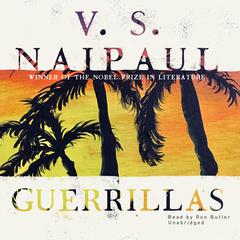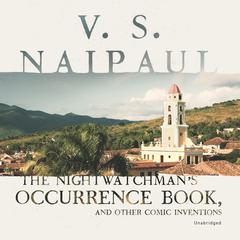 Play Audiobook Sample
Play Audiobook Sample
A Bend in the River Audiobook
 Play Audiobook Sample
Play Audiobook Sample
Quick Stats About this Audiobook
Total Audiobook Chapters:
Longest Chapter Length:
Shortest Chapter Length:
Average Chapter Length:
Audiobooks by this Author:
Publisher Description
This incandescent novel chronicles both an internal journey and a physical trek into the heart of Africa, a place caught between the dangerously alluring modern world and its own tenacious past and traditions. Exploring political and individual corruption, it expresses skepticism about the ability of newly decolonized nations to forge independent identities.
Salim, a Muslim Indian merchant, opens a store in a sleepy small town at a bend in the river, whose inhabitants include a Belgian priest, a witch, and a white intellectual named Raymond. The president of the new country is a demagogue called the Big Man who hires Raymond as his speechwriter. Salim loses control of his store to the commercially inexperienced Citizen Theotime, who hires Salim to manage it. Gradually, the town's veneer of civilization begins to crumble.
Download and start listening now!
"Naipaul is sexist, conservative, and may on some level support neo-colonialism. Or so say his many critics. Some of his later works and interviews certainly back up these claims. I chose, however, to read this book with a fresh perspective, outside of any external criticism and influence. What I found between these pages was one of the most hypnotic, harrowing stories I have ever read. An Indian man named Salim moves to a recently ravaged town in an unnamed African country (some say this takes place in what was Zaire, now the Democratic Republic of the Congo) in order to establish a new life for himself. Though damaged by a revolution, the town seems to be on the mend, and Samil is content to open a store and await the country's rebirth. What is later born, however, is something for which Samil and his compatriots are not prepared. The writing is stark yet fluid, moving the novel's events like a stream, into a river, into a rushing river, into a terrifying crescendo."
— Eric (4 out of 5 stars)
Quotes
-
“Austere and brilliant…Naipaul has mastered the gift of creating an aura of psychic and moral tension…A novelist has to be faithful to what he sees, and few see as well as Naipaul.”
— New York Times Book Review -
“In a vigilant style, which has been deservedly admired, [Naipul] transforms rage into precision and allows events to speak with their own inherent irony.”
— Swedish Academy, announcing the 2001 Nobel Prize in Literature -
“Confirms Naipaul’s position as one of the best writers now at work.”
— Newsweek -
“Vance delivers the detached ferocity that won Naipaul the Nobel Prize.”
— AudioFile
Awards
-
One of Modern Library's 100 Best English-Language Novels of the Twentieth Century
-
A 1979 Man Booker Prize Finalist
A Bend in the River Listener Reviews
-
" A beautifully crafted unraveling that moves perfectly slowly...just like Congo. "
— Amy, 2/20/2014 -
" sad and beautiful. well worth the read. "
— Ashira, 1/27/2014 -
" I recognize this novel's quality for its depth & economical prose & its ability to bring to life daily life in contemporary Africa. Yet it somehow never fully engaged me; I plodded through it uninspired & recognizing that I was missing much of its meaning. "
— Marvin, 1/26/2014 -
" A portrait of Central Africa in the late 60's and 70's, but seems as current as today's headlines. The protaganist is a man who owns a small shop in Central Africa. He is of Indian origin but his family has lived in Africa for generations. Naipul is a wonderful stylist and his writing of the postcolonial era is arguably his own experience. It feels more like a reflective memoir. "
— Iva, 1/20/2014 -
" A book about an Indian man living in a small town in a newly independent African nation - again, a large struggle told through an every day story "
— Briana, 1/18/2014 -
" There are several things that Naipaul got right in A Bend in the River, especially the angst of the Gujarati whose ancestors came to Africa from western India around the turn of the last century and who still worry about their place and security in modern Africa. However his patronizing depiction of indigenous Africans is superficial at best. For a much more nuanced story of European-African interactions at the end of the colonial period and beginning of the post-colonial period, I would recommend James Penhaligon's memoir of growing up in northwest Tanganika in the 1950s, Speak Swahili Dammit. "
— Dan, 1/11/2014 -
" I liked the theme, of how there might be a temporary bend in a river, but it will soon resume to its natural course. However, the story took a long time in the telling, and some parts dragged on too much for me. "
— Ora, 1/4/2014 -
" One of the best books I read this year. "
— Phillygrrl, 11/25/2013 -
" If you wonder why most of the dark continent is still dark, a cesspool of corruption and tribal violence, you will find the answers in this very well written book by a Nobel prize winning author. "
— Mark, 11/4/2013 -
" unsure why i keep trying naipaul... "
— vivian, 6/5/2013 -
" too political for me "
— B.J., 12/13/2012 -
" Loved this "in an unnamed African country" novel -- could not help myself from speculating... Rich in atmosphere, cultural detail, suspense... "
— Catherine, 3/19/2012 -
" I loved this book, why did it take me so long to read it? It was first published in 1979 and is certainly about Kisangani, Congo, where I lived in the early 1970's. So true in terms of the culture of the Africans vs the colonials vs the missionaries vs the Pakistani/Indian commercants. "
— Suz, 3/4/2012 -
" A masterpiece of literature that brings the collision of old and new together, set in Africa. "
— David, 5/17/2011 -
" A good novel with uncomfortable themes and a very nuanced, almost unclear message. "
— Eladiob, 5/3/2011 -
" This reader's first experience with V.S. Naipaul. He's got the gift. A good Africa river tale. Odd wife beating scene about three quarters in made me wonder about ol' V.S. Creepy. "
— Sharon, 3/28/2011 -
" pretty good. but why so many books about africa? "
— Bonnie, 3/11/2011 -
" excellent. recommended esp. if twentieth century history of africa is of interest. "
— Maggie, 3/7/2011 -
" Hard to swallow the domestic violence scene after reading Naipaul's bio. Regardless, interestingly plotted - more fluid than a linear structure. That a good 30 pages takes place on Gloucester Road doesn't hurt. Vivid descriptions of London. "
— Brian, 2/7/2011 -
" I wasn't until the end that I loved this book. "
— Lloyd, 1/13/2011
About V. S. Naipaul
V. S. Naipaul (1932–2018) was the author of more than thirty books of fiction and nonfiction. His honors include the Nobel Prize for Literature, the Booker Prize, the Trinity Cross, and a knighthood for services to literature. He was named a finalist for the 2009 Man Booker International Prize for achievement in fiction. He was born in Trinidad in 1932 and went to Oxford on a scholarship in 1950.
About Simon Vance
Simon Vance (a.k.a. Robert Whitfield) is an award-winning actor and narrator. He has earned more than fifty Earphones Awards and won the prestigious Audie Award for best narration thirteen times. He was named Booklist’s very first Voice of Choice in 2008 and has been named an AudioFile Golden Voice as well as an AudioFile Best Voice of 2009. He has narrated more than eight hundred audiobooks over almost thirty years, beginning when he was a radio newsreader for the BBC in London. He is also an actor who has appeared on both stage and television.





